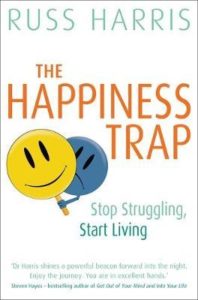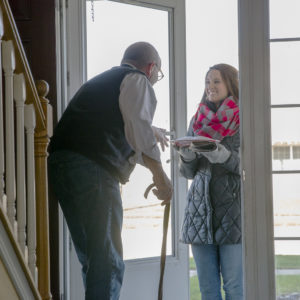 We have all been under a lot of stress over recent months. Between the COVID-19 pandemic, Black Lives Matter demonstrations, rioting and looting and the upcoming elections, many of us feel like our lives have been turned upside down.
We have all been under a lot of stress over recent months. Between the COVID-19 pandemic, Black Lives Matter demonstrations, rioting and looting and the upcoming elections, many of us feel like our lives have been turned upside down.
Most of us have figured out that we will not be returning to “normal” any time soon. But what can we do today to help ourselves, our families and our friends get through this?
 Russ Harris, author of The Happiness Trap, recommends a nine-step strategy for managing this and any other crisis. Conveniently enough, it spells out the words “FACE-COVID:”
Russ Harris, author of The Happiness Trap, recommends a nine-step strategy for managing this and any other crisis. Conveniently enough, it spells out the words “FACE-COVID:”
First, FOCUS ON WHAT’S IN YOUR CONTROL. We cannot control the future. We cannot control the coronavirus itself, or the world economy, or how governments manage this whole mess. We cannot magically change our feelings, eliminating all our perfectly natural fears and anxieties. But we can control what we do – here and now. And that matters. Because what we do today can make a huge difference.
ACKNOWLEDGE YOUR THOUGHTS AND FEELINGS. Let yourself experience whatever is happening inside you: thoughts, feelings, emotions, memories, sensations, urges. Observe what is happening in your inner world, then put it into words and silently say to yourself something like “I’m noticing anxiety” or “My mind is worrying” or “I’m having a feeling of sadness.”
 Then CONNECT WITH YOUR PHYSICAL BODY. You could do this by taking a few slow, deep breaths, or by slowly straightening your back and spine, or by sitting upright and forward in your chair, or by exercising, or even by slowly pressing your fingertips together for a few moments. Even though we cannot always control our feelings, we can take control over our physical actions.
Then CONNECT WITH YOUR PHYSICAL BODY. You could do this by taking a few slow, deep breaths, or by slowly straightening your back and spine, or by sitting upright and forward in your chair, or by exercising, or even by slowly pressing your fingertips together for a few moments. Even though we cannot always control our feelings, we can take control over our physical actions.
As you acknowledge your thoughts and feelings and come back into your body, ENGAGE IN WHAT YOU ARE DOING. Get a sense of where you are and refocus your attention on what you are doing. Notice three or four things you can hear. Look around the room and notice five things you can see. Notice what you can smell or taste or sense in your nose and mouth. Then give your full attention to the task at hand.
Anchor yourself by running through the “ACE cycle” slowly three or four times:
- Acknowledge your thoughts and feelings
- Connect with your physical body
- Engage in what you are doing
 After the ACE steps, the most important thing is to take COMMITTED ACTION. In other words, do something guided by your core values. Action you take because it is truly important to you. Obviously, that includes all those protective measures against COVID-19 – wearing masks in public, frequent handwashing, social distancing, and so on. But in addition to those fundamentals, consider: What are simple ways to look after yourself, those you live with, and those you can realistically help? What kind, caring, supportive deeds can you do? Can you say some kind words to someone in distress – in person or via a phone, video or text? Can you help someone with a task or a chore, or cook a meal, or hold someone’s hand, or play a game with a young child?
After the ACE steps, the most important thing is to take COMMITTED ACTION. In other words, do something guided by your core values. Action you take because it is truly important to you. Obviously, that includes all those protective measures against COVID-19 – wearing masks in public, frequent handwashing, social distancing, and so on. But in addition to those fundamentals, consider: What are simple ways to look after yourself, those you live with, and those you can realistically help? What kind, caring, supportive deeds can you do? Can you say some kind words to someone in distress – in person or via a phone, video or text? Can you help someone with a task or a chore, or cook a meal, or hold someone’s hand, or play a game with a young child?
And if you are spending more time at home, what are the most effective ways to spend that time? You may want to consider physical exercise to stay fit, cooking healthy food, and doing meaningful activities by yourself or with others. Remember, though, that you do not always have to be “productive.” Take care of yourself!
OPENING UP up means making room for difficult feelings and being kind to yourself. Difficult feelings are guaranteed to keep on showing up: fear, anxiety, anger, sadness, guilt, loneliness, frustration, confusion, and many more.
We cannot stop these negative emotions: they are normal reactions. But we can open up and make room for them. Acknowledge they are normal, allow them to be there, and treat ourselves kindly.
 Remember, self-kindness is essential if you want to cope well with this or any other crisis – especially if you are in a caregiver role. If you’ve ever flown on a plane, you’ve heard this message: “In event of an emergency, put on your own oxygen mask before assisting others.” Self- kindness is your own oxygen mask; if you need to look after others, you will do it better if you are also taking good care of yourself.
Remember, self-kindness is essential if you want to cope well with this or any other crisis – especially if you are in a caregiver role. If you’ve ever flown on a plane, you’ve heard this message: “In event of an emergency, put on your own oxygen mask before assisting others.” Self- kindness is your own oxygen mask; if you need to look after others, you will do it better if you are also taking good care of yourself.
Ask yourself, ‘If someone I loved was going through this experience, feeling what I am feeling – if I wanted to be kind and caring towards them, how would I treat them? How would I behave towards them? What might I say or do?’ Then try treating yourself the same way.
Committed action should be guided by your core VALUES. What do you want to stand for in the face of this crisis? What sort of person do you want to be as you go through this? How do you want to treat yourself and others? Your values might include love, respect, humor, patience, courage, honesty, caring, openness, kindness…. or numerous others. Look for ways to ‘sprinkle’ these values into your day. Let them guide and motivate your committed action.
 IDENTIFY RESOURCES for help, assistance, support, and advice. This includes friends, family, neighbors, health professionals, emergency services. And make sure you know the emergency helpline phone numbers, including psychological help if required.
IDENTIFY RESOURCES for help, assistance, support, and advice. This includes friends, family, neighbors, health professionals, emergency services. And make sure you know the emergency helpline phone numbers, including psychological help if required.
Also reach out to your social networks. And if you can offer support to others, let them know; you can be a resource for other people, just as they can be for you.
One very important aspect of this process involves finding a reliable and trustworthy source of information for updates on the crisis and guidelines for responding to it.
I am sure you already know to do this, but the last step in the FACE COVID strategy is to DISINFECT AND DISTANCE PHYSICALLY. Clean and disinfect your hands regularly and practice as much social distancing as realistically possible, for the greater good of your community. And remember, we are talking about physical distancing – not cutting off emotionally.
So again, and again and again, as problems pile up in the world around you and emotional storms rage in the world within you, come back to the steps of FACE COVID:

These are crazy, difficult, scary times, so please do treat yourself kindly. And remember the words of Winston Churchill: “When you’re going through hell, keep going.”